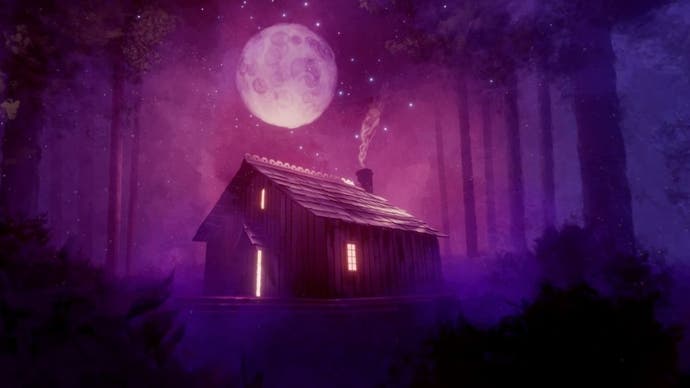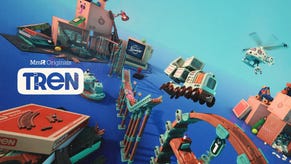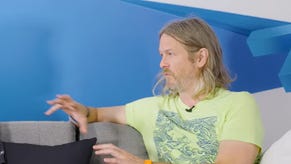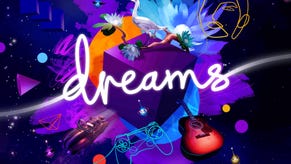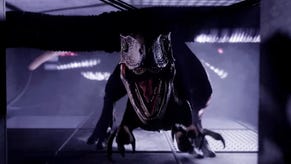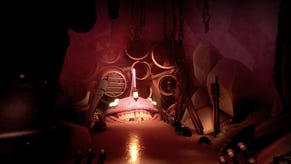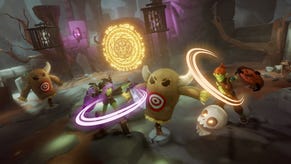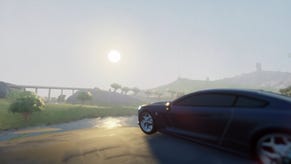Why did Dreams take Media Molecule seven years to make?
'The question should be how did you manage to do it in that time!'
Finally, some seven years after it first broke cover at 2013's PlayStation Meeting as it accompanied the unveiling of the PlayStation 4, Media Molecule's Dreams is here, its long and winding road concluding towards the tail-end of that particular console's life. Except it's not the end of Dreams, of course - it's the beginning of a project that will transform over time according to the community's needs and wants.
Talking about Dreams can be confusing like that, probably because we keep making the mistake of treating it like a regular video game. The more time you spend with it, though, the more you realise it isn't that at all - it's a whole new platform, a place to create and share and a dazzling toolkit that's already been put to fantastic use.
I'm still not entirely sure what it is, but I do know that the more time I spend with it the more I love it. I got the chance to sit down with Media Molecule's Alex Evans and Mark Healey as they celebrated the launch to talk about what's taken them so long, what's changed along the way and where they think Dreams might be heading.
So last time I met you was at the PlayStation experience five years ago - and I think we all thought the game was imminent then.
Alex Evans: Yeah, it was. I mean, it was one of those funny things where we had made a thing where you could make beautiful stuff, but it was really painful, not very fun to make stuff with and we could take the pain of using it every day, but it wasn't what we wanted it to be. And, you know, Sony gave us the rope to try again. Basically, I joked that this is Dreams 2. But we've taken the time to make the thing we wanted it to be.
Did you have to go back and start from scratch?
Alex Evans: I mean, not from scratch - I think every game maker will tell you this, you go through a process of searching for what it is that makes your idea work again, same idea, same plan, but then you're like, 'Oh, this is rubbish, this particular path we've gone down'. You do have to backtrack sometimes - we took a big backward step. We looked at what we had, and I'm so glad we did it because I look back at those old videos and I'm like, the content was cool. The levels we were making were beautiful and everything but the process of creation wasn't good enough for the community to flourish.
To my eyes it doesn't look that different to what I saw back in 2015 - I thought it looked great back then!
Alex Evans: A lot of it's about making it easier. We put a lot of effort into stuff like tutorials - which sounds very boring and schooly, but the tools are actually kind of funny. There's a joke that the last 10% takes 90% of the time - and it was that, it was making it good, fun and easy. And that's what we focused on. I'm going to maybe probably butcher this because I'm not exactly sure what he said - I didn't read the original quote - but there was the bloke who made this sort of Wipeout clone, and it went viral and Kotaku picked it up. And someone asked him why didn't you use Unity? Why don't you just use Unreal? And he said, because I had no idea that I was going to make this game. I didn't have a plan. I'm not a game maker. I didn't even think of myself as someone who's going to go and make this particular game that's going to go viral. I just had fun making a thing. And it sort of blossomed and turned into this. And that's Dreams for me. That was a really nice little parable, and I'm proud Dreams can let someone just be doodling and then for it to flourish rather than someone saying I will be the next Mike Bithell, I'll be the next indie sensation. You can do that too hopefully.
I wanted to talk about that, because you've talked about people self-publishing before.
Alex Evans: Yeah Mark likes to mention that [see sidebar], and it makes people from Sony clench.
But it's an interesting point - I wanted to ask you about how people can self-publish but I'm slowly realising maybe that's not the point. I make music in my spare time but I never want anyone to hear it. It doesn't have to be about financial gain or getting recognition.
Alex Evans: Yeah, that's a key point. And then if you stumble on something brilliant, great and you've got an outlet and you've got a platform to release it. We talk about LittleBigPlanet amongst ourselves, and there's all these levels with people making stupid ramps that they never published. And all these tracks that you have on your hard drive you've never released, it doesn't matter - they still mean something to you. They're real and they're fun and that was four hours of your life that was really enjoyable. I love those things.
Is there a perception problem around it still? There's the question of why it's taken seven years.
Alex Evans: Generally the people who ask why it's taken so long are the people who are excited for it, weirdly - it's the people who don't know about it who don't care! Because they didn't know about it. So hopefully they're now like, brilliant, it's out and I can make stuff. Barriers have come down. And I think that's the cool part. That'll be the story that'll be remembered.
Sony must have been asking some tough questions too. Do you have compromising photos of Jim Ryan or something? Can I see them?
Alex Evans: Shu was really great actually. You could argue they gave us too much rope. But I think they just wanted it to be right. And I think sometimes things take longer. I'm really glad we took the time to make it accessible. We all benefit from it being good creatively. I play with my daughter, mostly - mostly I just play in it and I feel like if we'd rushed it out, then the creative side might have just been one note or the results might be very limited in their scope. But I think what I'm seeing and come up this week in the Dreamiverse, there's a bunch of people I think we're holding back the release now they're just like dropping that like these big epics. I'm getting excited for these things to be released, and none of that would have happened if we'd rushed out this buggy thing.
We don't want this to be like Photoshop shit edition, or like bad Pro Tools. That wasn't the plan. It was always about reimagining those on a console. And we're always trying to bring ourselves back to performance. We're not trying to be those tools. We're trying to be something else all in one. There was a musician - I won't say who it was as he probably doesn't want to be quoted - he made a song in it. And at the end of it, he said, the biggest compliment I can give is it sounds like me. I'm looking forward to people saying they got their start in games through Dreams. Which makes me sound like a wanker.
No, not at all! Hopefully it's going to be a gateway - I know a lot of developers found their way into games via LittleBigPlanet.
Alex Evans: I got an email from someone at Insomniac who said their CV was mostly LittleBigPlanet. I think Dreams is going to be that.
What's the next step for people who want to get into development? Can you export assets?
Alex Evans: We're not announcing now but we are looking at feedback. People want to be able to use Dreams outside of Dreams, so we're looking at ways to make that easier. Even if it's just images, the sounds and music and stuff. So we're trialling a few ideas there. So we definitely, definitely want people to feel that they can use Dreams as a creative tool. It wasn't our starting point, but if that's where people want to go, then we'll listen.
You know, we started this as a sketchbook, and that's how most people use it. But if you've made something super amazing we need to make sure there is a next step. So we'll figure that out. Dreams is very much a service. I know that's a very trendy sort of thing to say but it clearly has to be.
The other thing I've seen over and over again and again, I sound like a wanker saying it but honestly this touched me, a lot of people are saying it's one of the nicest online communities they're part of. The Dreams community itself, for whatever reason, maybe the design choices, how the UI pushes collaboration, I don't know what it is, but people are saying it's given them an outlet they maybe didn't have before. So how do they take it to the next step? I don't know, we have to respond to the community and listen to them.
The community is lovely. What's the secret behind it?
Alex Evans: What's their secret! I don't know. I go into the Made In Dreams hashtag just to antidote my way out of Twitter hell. When you start out, you're a bit shy. And then you put something out there and you get feedback. And the feedback is considered and not just adulatory - it's like, oh, I really love this, have you considered this? And I think, going back to your earlier question, that's what's really surprised me.
Have you thought of getting other first party developers making stuff in here?
Alex Evans: We'd love to - shout out if you want to anyone who wants to make a game in Dreams with us! We were focused on Art's Dream, but now we've got this breathing moment where we can be like, oh, maybe we should make something else. And I think it would be amazing to do some collaborations. And also with education - we've got a few collaborations cooking outside of games as well, which I think is really interesting. So it's like, you know, theatre. Dreams isn't necessarily just about games. I'd love to see a TV show made in Dreams. That's not an announcement, there's no such thing in the works but I think that would be cool.
Is it difficult talking about something like Dreams? This is a problem that I think might have dogged you your entire career after LittleBigPlanet where people are asking 'what is it, what do you do in it?'
Alex Evans: I think there's different ways into Dreams, and Dreams will be different things to different people. My YouTube rabbit hole is different from your YouTube, probably. You know, like I said, it'll try and steer us towards alt-right nightmare, because that's what YouTube does, but you can still find wonderful shit. And I think Dreams is, luckily without the alt right nightmare, it can be different things to different people. So yeah, it's really hard to nutshell it.
While you've been making this a lot has happened in the world of YouTube and Twitter. Has that impacted you in any way?
Alex Evans: Subconsciously a bit yeah... I think again, though, it depends on your niche. I fell into making synthesisers as a hobby to sort of cleanse the head and I discovered electronics Twitter which was really nice. I think that's the internet at its best - it's kind of niche communities. It's always been good at that. It's these niche communities.
I was talking internally about Dreams and I was like, I think it's cool to use a Reddit analogy, you've got subreddits and each has its own character. Reddit is now no longer it's own thing, Reddit is a series of sub-communities. And I love the fact that Dreams probably is going to be big enough that there will be sub-communities of people building shooters, you know people will build games, people will build whimsical purple Media Molecule-esque stuff. But we wouldn't choose to make some of the stuff that the community has made. And that's the point. I think that social media is hard to paint with one brush, right? We try all the time - I do it myself - but it's not, it's actually this little rainbow of madness. And I'm totally rambling now.
Rambling is good! What does the next few years hold for Dreams?
Alex Evans: There's a few different angles. VR is in the pipeline and is actually nearly done to be honest. I'd love to get multiplayer in there but we haven't got a date for that as that's not nearly done, but that's one that I really care about as I designed the code for multiplayer from the beginning so I'm confident it'll come out, I just can't say when. And we're a game studio, we're not tools studio so they're going to want to get our teeth into some meaty content. So I think that we were going to make more games in Dreams for sure - 100% guaranteed.
And they will be free updates?
Alex Evans: I know there will be free updates, and they will be juicy. I don't know how we're going to package it. But what we're going to do is we're going to work in parallel on a few things. And VR is the most cooked of them. And then we'll release them as and when we can. I imagine we will have paid content - maybe if we got Kojima's Dreams, you know, if you're reading this Kojima come on down and we'll make Kojima's Dreams.
I know you can't talk about other platforms explicitly, but, well, there is one coming out later this year. In theory what would you be able to do on other platforms?
Alex Evans: I've not been asked that question before... I obviously can't say PlayStation 5 is brilliant! Although it's been announced so I can say the word. I mean, obviously, we're going to look at that, we're a PlayStation studio. Dreams actually already runs on PlayStation 5 - there you go, that's the scoop. But that's just us being devs and exploring. I'd be lying to you if I said we weren't going to explore, but there's literally zero plans at the moment. I think I've learned my lesson - we met in 2015 and I said [Dreams] is nearly done! And then here we are, four or five years later, and it *is* done. But my new self, I will admit that we're exploring things but I'm not going to commit to when it comes out.
I would love to see dreams used in different contexts. Education is a big one for me, I'd love to see Dreams used in school, and theatre and other places.
And that's something you're obviously working towards at the moment.
Alex Evans: We've got a secret project that's going to be coming out soon. It's nothing to do with games. This is a collaboration with somebody. And I need to double check when that's being announced. Sorry, I'm such a tease, but I'm gonna have to be a tease. It's like Dreams in a completely different context than you've ever seen before. And it's lovely. It's really cool to see it there. And I think it'd be awesome for kids to learn electronics or game making or storytelling or moviemaking or sculpting or composition, like all sorts of shit you could use in school. If you're a teacher reading this article consider using Dreams in your curriculum!
Did you ever imagine it was going to take this long back when you first showed it off at the PlayStation meeting back in - was it 2013?
Alex Evans: It was eight years ago and then we did Tearaway in the middle as a palate cleanser. No I didn't!
Has the scope changed? Is it faithful to the original idea?
Alex Evans: It's faithful to the idea - the quality bar is higher than I could ever hoped for. I didn't know it was going to be painterly, it took us a while to discover that. It took us a while to discover what the gameplay was, the characters. Even Art's Dream - we had Crystal's Dream which was the first game we made and then we didn't release that. It took us longer because we were finding what we wanted to show the world. No, I don't think it'd take that long. But I'm very happy we took that long.
